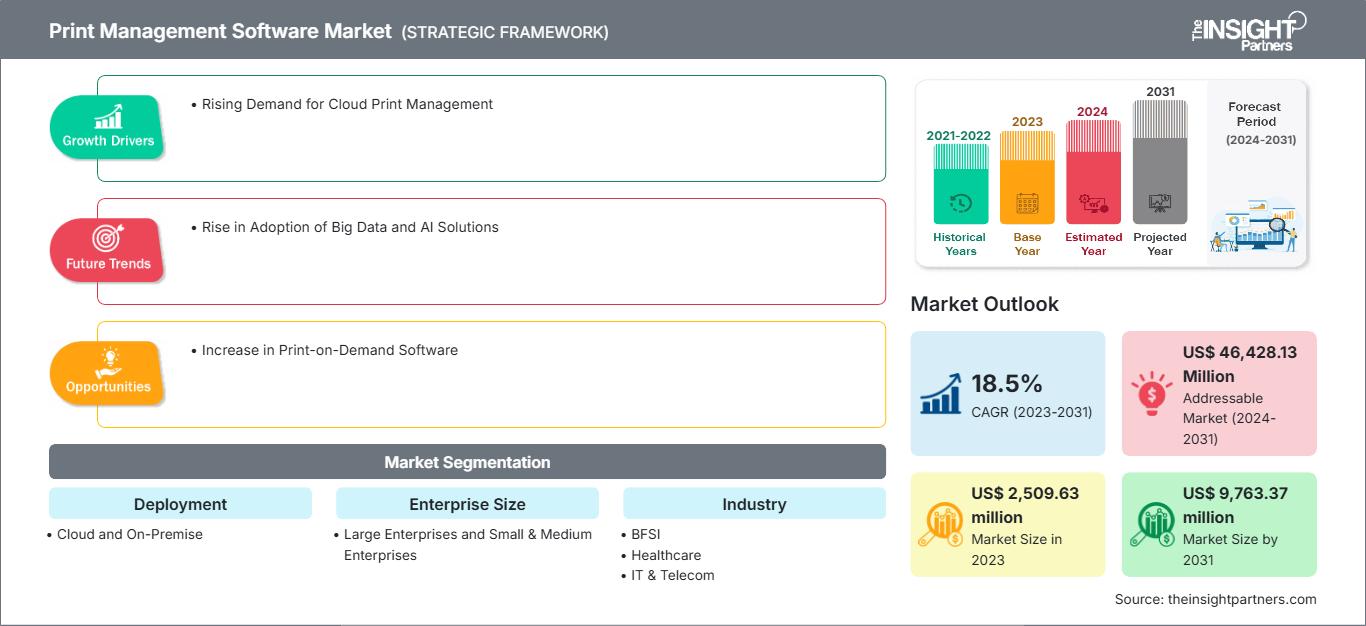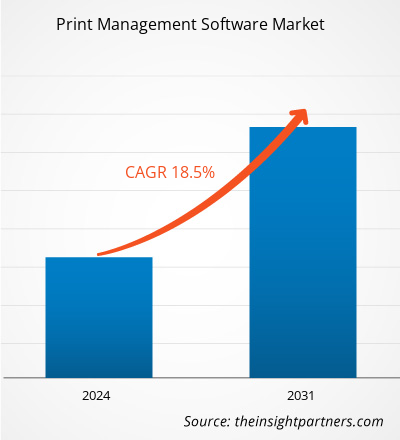Print Management Software Market Size, Share, and Analysis by 2031
Print Management Software Market Size and Forecast (2021 - 2031), Global and Regional Share, Trend, and Growth Opportunity Analysis Report Coverage: By Deployment (Cloud and On-Premise), Enterprise Size (Large Enterprises and Small & Medium Enterprises), and Industry (BFSI, Healthcare, IT & Telecom, Retail, and Others), and Geography
Historic Data: 2021-2022 | Base Year: 2023 | Forecast Period: 2024-2031- Report Date : May 2024
- Report Code : TIPRE00012025
- Category : Technology, Media and Telecommunications
- Status : Published
- Available Report Formats :


- No. of Pages : 164
The print management software market size is projected to reach US$ 9,763.37 million by 2031 from US$ 2,509.63 million in 2023. The market is expected to register a CAGR of 18.5 % during 2023–2031. The rise in the adoption of big data and AI solutions is likely to remain a key trend in the market.
Print Management Software Market Analysis
The key stakeholders in the print management software market include software providers, system integrators, and end users. Print management software providers develop and sell the software for organizations to help them manage their printing infrastructure. Some of the leading vendors include HP, Xerox, Canon, Ricoh, PaperCut, and Y Soft. System integrators are crucial players in the print management software market ecosystem. They act as a bridge between various components in the ecosystem to ensure a seamless and optimized printing environment for businesses. Also, they play a crucial role in integrating diverse solutions. End users are the organizations that use print management software to manage their printing infrastructure. End users can be of any size, from small businesses to large enterprises, e.g., BFSI, IT & telecom, healthcare, and retail.
Print Management Software Market Overview
Print management software is intended to effectively and efficiently manage printing devices and processes. With the installation of the software, the process of monitoring, maintaining, and controlling the entire printer fleet through a single application interface becomes effortless. It facilitates distribution, printing, quick printing, and offset printing functions. The increasing demand for real-time data on the printer fleet and the growing need for enterprise printing process management and optimization through print management software are among the other factors expected to continue to support the market growth globally in the coming years.
Customize This Report To Suit Your Requirement
Get FREE CUSTOMIZATIONPrint Management Software Market: Strategic Insights

-
Get Top Key Market Trends of this report.This FREE sample will include data analysis, ranging from market trends to estimates and forecasts.
Print Management Software Market Drivers and Opportunities
Rising Demand for Cloud Print Management
As print management software helps integrate and support the workplace’s cloud environment, there is a rapid demand for cloud printing among organizations with server racks and local infrastructure. In addition, cloud print management monitors, tracks, and administers print environments in the cloud instead of using a print server, which is an on-premises infrastructure. Several key players in the market provide a wide range of print management products for customers seeking private and public cloud print solutions. In June 2022, Ricoh Canada Inc. announced the launch of RICOH Print Management Cloud to streamline print infrastructure, eliminate print servers, and reduce IT burden with this cost-effective SaaS solution. Thus, businesses are looking for robust and secure printing without needing print servers on-site.
Increase in Print-on-Demand Software
POD software helps in accurately and efficiently managing and optimizing printing machines and other procedures. Also, POD software is mainly available as standalone software and embedded functionality in managed print facilities. Tracking, managing, and controlling the entire printer fleet from a single application interface also helps businesses save money on printing. Scanners, desktop printers, and managed copiers further allow for unified control in the print management software. These factors, as a result, are anticipated to create lucrative market growth opportunities in the upcoming years.
Print Management Software Market Report Segmentation Analysis
Key segments that contributed to the derivation of the print management software market analysis are deployment, enterprise size, and Industry.
- Based on the deployment, the print management software market is divided into cloud and on-premise. The cloud segment held a larger market share in 2023.
- By enterprise size, the market is segmented into large enterprises and small & medium enterprises. The large enterprises segment held a larger market share in 2023.
- By vertical, the market is segmented into BFSI, healthcare, IT & telecom, retail, and others.
Print Management Software Market Share Analysis by Geography
The geographic scope of the print management software market report is mainly divided into five regions: North America, Asia Pacific, Europe, Middle East & Africa, and South & Central America.
The market in Asia Pacific is projected to experience notable growth during the forecast period due to the increasing number of print management software providers and growing emphasis on reducing printing costs.
Print Management Software
Print Management Software Market Regional Insights
The regional trends and factors influencing the Print Management Software Market throughout the forecast period have been thoroughly explained by the analysts at The Insight Partners. This section also discusses Print Management Software Market segments and geography across North America, Europe, Asia Pacific, Middle East and Africa, and South and Central America.
Print Management Software Market Report Scope
| Report Attribute | Details |
|---|---|
| Market size in 2023 | US$ 2,509.63 million |
| Market Size by 2031 | US$ 9,763.37 million |
| Global CAGR (2023 - 2031) | 18.5% |
| Historical Data | 2021-2022 |
| Forecast period | 2024-2031 |
| Segments Covered |
By Deployment
|
| Regions and Countries Covered |
North America
|
| Market leaders and key company profiles |
|
Print Management Software Market Players Density: Understanding Its Impact on Business Dynamics
The Print Management Software Market is growing rapidly, driven by increasing end-user demand due to factors such as evolving consumer preferences, technological advancements, and greater awareness of the product's benefits. As demand rises, businesses are expanding their offerings, innovating to meet consumer needs, and capitalizing on emerging trends, which further fuels market growth.

Print Management Software Market News and Recent Developments
The print management software market is evaluated by gathering qualitative and quantitative data post primary and secondary research, which includes important corporate publications, association data, and databases. A few of the developments in the print management software market are listed below:
- PaperCut announced that Google has standardized on PaperCut MF to strengthen its internal print infrastructure. The announcement follows Google Cloud Print's demise. This service enabled internal and external users to print from any Cloud Print-aware application, on any device in the network cloud to any printer, with the ability to connect to cloud print services. (Source: PaperCut, Press Release, July 2022)
- ThinPrint, one of the leading suppliers of print management solutions, launched a new approach for high-availability printing. The ThinPrint LPD Service provides a high-availability printing, including load balancing from ERP, EMR, and CRM systems. ThinPrint thus provides an important tool for preventing business-critical outages. (Source: ThinPrint, Press Release, December 2023)
Print Management Software Market Report Coverage and Deliverables
The “Print Management Software Market Size and Forecast (2021–2031)” report provides a detailed analysis of the market covering below areas:
- Print management software market size and forecast at global, regional, and country levels for all the key market segments covered under the scope
- Print management software market trends as well as market dynamics such as drivers, restraints, and key opportunities
- Detailed PEST/Porter’s Five Forces and SWOT analysis
- print management software market analysis covering key market trends, global and regional framework, major players, regulations, and recent market developments
- Industry landscape and competition analysis covering market concentration, heat map analysis, prominent players, and recent developments for the print management software market
- Detailed company profiles
Frequently Asked Questions
Ankita is a dynamic market research and consulting professional with over 8 years of experience across the technology, media, ICT, and electronics & semiconductor sectors. She has successfully led and delivered 100+ consulting and research assignments for global clients such as Microsoft, Oracle, NEC Corporation, SAP, KPMG, and Expeditors International. Her core competencies include market assessment, data analysis, forecasting, strategy formulation, competitive intelligence, and report writing.
Ankita is adept at handling complete project cycles—from pre-sales proposal design and client discussions to post-sales delivery of actionable insights. She is skilled in managing cross-functional teams, structuring complex research modules, and aligning solutions with client-specific business goals. Her excellent communication, leadership, and presentation abilities have enabled her to consistently deliver value-driven outcomes in fast-paced and evolving market environments.
- Historical Analysis (2 Years), Base Year, Forecast (7 Years) with CAGR
- PEST and SWOT Analysis
- Market Size Value / Volume - Global, Regional, Country
- Industry and Competitive Landscape
- Excel Dataset
Recent Reports
Testimonials
The Insight Partners' SCADA System Market report is comprehensive, with valuable insights on current trends and future forecasts. The team was highly professional, responsive, and supportive throughout. We are very satisfied and highly recommend their services.
RAN KEDEM Partner, Reali Technologies LTDsI requested a report on a very specific software market and the team produced the report in a few days. The information was very relevant and well presented. I then requested some changes and additions to the report. The team was again very responsive and I got the final report in less than a week.
JEAN-HERVE JENN Chairman, Future AnalyticaWe worked with The Insight Partners for an important market study and forecast. They gave us clear insights into opportunities and risks, which helped shape our plans. Their research was easy to use and based on solid data. It helped us make smart, confident decisions. We highly recommend them.
PIYUSH NAGPAL Sr. Vice President, High Beam GlobalThe Insight Partners delivered insightful, well-structured market research with strong domain expertise. Their team was professional and responsive throughout. The user-friendly website made accessing industry reports seamless. We highly recommend them for reliable, high-quality research services
YUKIHIKO ADACHI CEO, Deep Blue, LLC.This is the first time I have purchased a market report from The Insight Partners.While I was unsure at first, I visited their web site and felt more comfortable to take the risk and purchase a market report.I am completely satisfied with the quality of the report and customer service. I had several questions and comments with the initial report, but after a couple of dialogs over email with their analyst I believe I have a report that I can use as input to our strategic planning process.Thank you so much for taking the extra time and making this a positive experience.I will definitely recommend your service to others and you will be my first call when we need further market data.
JOHN SUZUKI President and Chief Executive Officer, Board Director, BK TechnologiesI wish to appreciate your support and the professionalism you displayed in the course of attending to my request for information regarding to infectious disease IVD market in Nigeria. I appreciate your patience, your guidance, and the fact that you were willing to offer a discount, which eventually made it possible for us to close a deal. I look forward to engaging The Insight Partners in the future, all thanks to the impression you have created in me as a result of this first encounter.
DR CHIJIOKE ONYIA MANAGING DIRECTOR, PineCrest Healthcare Ltd.Reason to Buy
- Informed Decision-Making
- Understanding Market Dynamics
- Competitive Analysis
- Identifying Emerging Markets
- Customer Insights
- Market Forecasts
- Risk Mitigation
- Boosting Operational Efficiency
- Strategic Planning
- Investment Justification
- Tracking Industry Innovations
- Aligning with Regulatory Trends





 Get Free Sample For
Get Free Sample For